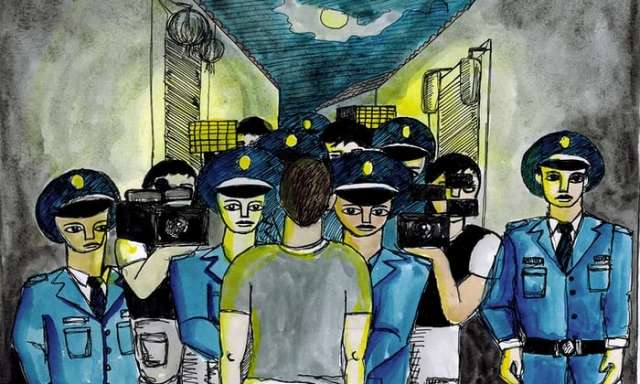Three men, in three different parts of China. They didn't know each other, but all had one thing in common: They advocated for human rights and became caught up in what activists say is the Chinese government's brutal crackdown on dissent.
Rights groups say President Xi Jinping's wide-reaching sweep on perceived threats to both his rule and the Chinese Communist Party has led to the arrests of dozens of activists, bloggers, feminists, artists and lawyers.
The men, who CNN spoke to in detail over the course of the last 12 months, describe being forcibly taken from their homes, detained for weeks, sometimes months, in secret prisons, denied communication with family and legal representation, strong-armed into making videotaped confessions, and ultimately released without being convicted of a single crime.
Sui, Chen and Dahlin all say they were explicitly told not to talk about what happened to them, but have decided to speak out anyway. They say they want to shed light on the lengths to which China's government will go to silence anyone it deems a threat.
CNN reached out to the Chinese government for comment on each of the cases in this story, but received no response until the report published.
"China is a country with the rule of law. Chinese judicial authorities fully guarantee all legal rights of criminal suspects when handling their cases. We hope foreign media outlets based in China respect China's judicial sovereignty, respect facts, and cover the news objectively and fairly," the Ministry of Foreign Affairs said in fax dated November 24.
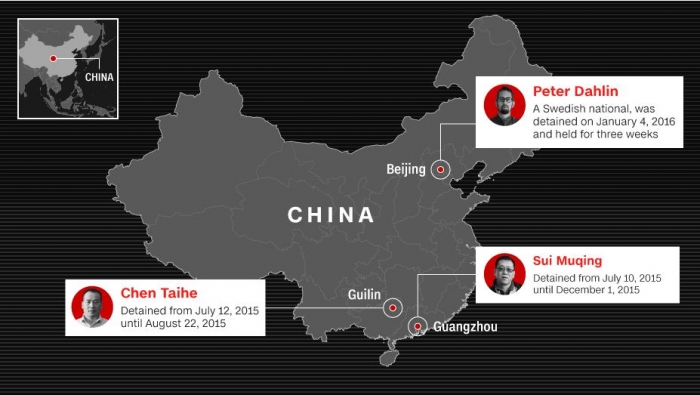
The 709 crackdown
While being a human rights lawyer has never been an easy path in Communist China, forced disappearances of lawyers were rare before 2015.
But on July 9 of that year, prominent Beijing rights lawyer Wang Yu disappeared, along with her husband, also a lawyer, and their teenage son.
The following day, police raided Wang's law firm and detained seven of her colleagues. Seven other rights lawyers were also detained or reported missing, according to the Hong-Kong based China Human Rights Lawyers Concern Group, which has meticulously documented the cases. It became known as the "709 crackdown" - a reference to the date the first arrests occurred.
Sui was among them. He'd earlier in the day spoken to two foreign media outlets to raise concern about Wang's disappearance.
That night, a security guard called up to Sui's apartment and said his car had been scratched in an accident and when he stepped outside, a group of police quickly whisked him away, said Sui. He wasn't seen again for nearly five months.
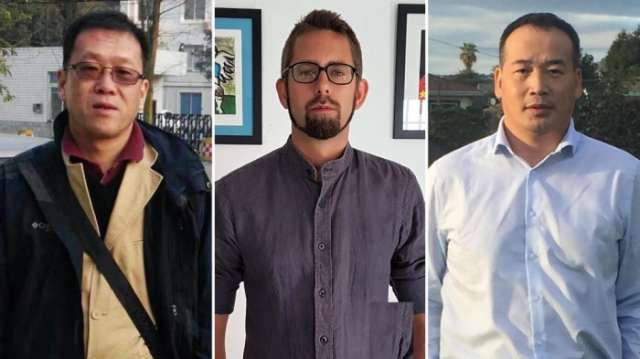
From left to right: Sui Minqing, Peter Dahlin and Chen Taihe.
Two days later, on July 12, the same thing happened to Chen. He said police asked him to come down from his apartment to answer a few questions. "I intentionally left my cell phone upstairs in my apartment because I thought I'd be back in a few minutes." He didn't return for six weeks.
During a period of less than a week, at least 146 lawyers and their families were detained in a nationwide swoop according to China Human Rights Lawyers Concern Group.
Rights groups say the roots of the crackdown on lawyers can be traced back to an editorial in the overseas edition of state-run People's Daily in July 2012, which warned the United States would use five categories of people to destabilize the Communist Party's near seven-decade rule. Rights advocates and lawyers were at the top of the list.
Dahlin, a Swedish national who co-founded a Beijing-based NGO that provided legal aid and training to Chinese lawyers, wasn't caught up in the first wave of detentions, and assumed his status as a foreigner might offer him some protection.
In early January 2016, however, he got tipped off authorities might be after him. He was about to depart for Beijing airport when 20 police officers turned up at his apartment.
They detained him and his girlfriend and they ransacked his home, he says, seizing computers and documents.
Dahlin says he was accused of masterminding a plan to smuggle the son of Wang Yu, the first lawyer to be detained in the swoop, into Myanmar, in an effort to evade authorities in October 2015.
He said investigators realized early on he had nothing to do with it, but instead of letting him go, quickly turned their attention to his NGO -- Chinese Urgent Action Working Group - pressing him to give up information about his colleagues and other activists his group worked with.
Authorities said that Dahlin worked for an illegal organization that sponsored activities that jeopardized China's national security. The NGO said it "undertakes rapid response assistance for rights defenders in need."
By October 2017, some 321 lawyers, rights activists, their family members and staff had been caught up in the 709 crackdown, according to the China Human Rights Lawyers Concern Group.
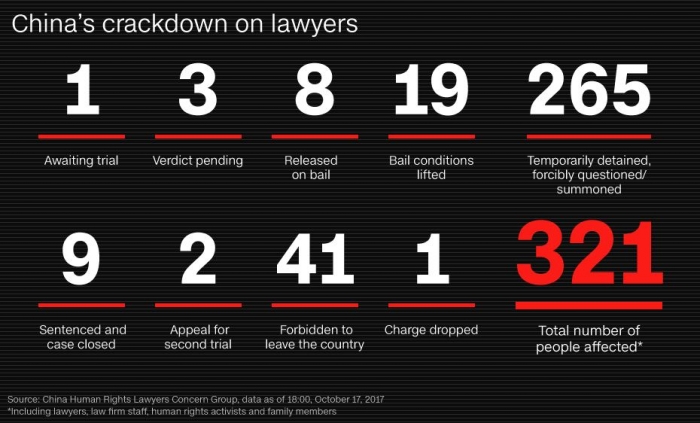
How lawyers disappear
A key tool in the crackdown has been a relatively new form of detention. In 2012, China introduced "residential surveillance at a designated location" (RSDL) into the Criminal Procedural Law.
It appeared to legalize a long-used practice of "black jails" -- a means of temporarily detaining people outside the Chinese legal system who could not be immediately charged with a crime.
The government denied black jails existed in 2009. But in 2011 Chinese state media reported on a campaign by the Beijing Municipal Public Security Bureau to crack down on them.
The amended law says residential surveillance shouldn't exceed six months but requires detainees' families be notified within 24 hours, unless they can't be reached, and guarantees all suspects the right to a lawyer, with whom a meeting should be granted within 48 hours of a request.
Critics of the new system and former detainees say it gives arbitrary detention a legal gloss and normalizes enforced disappearances. Earlier this year, 11 countries called on China to end the practice and investigate reports of torture against human rights lawyers. The UN High Commission on Human Rights has also called on China to halt the detention of lawyers.
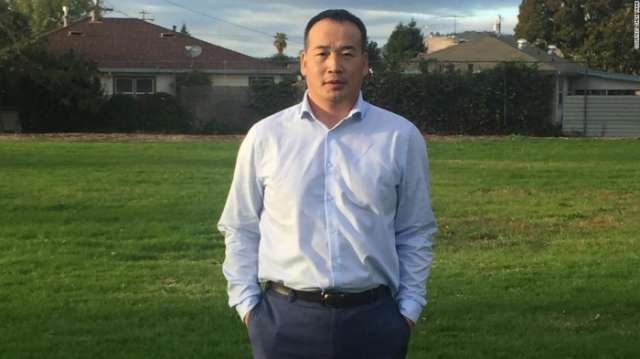
Chen Taihe, a blogger, was detained in Guilin. He now lives in the US.
Although they were held at opposite ends of the country, Sui, Chen and Dahlin all describe similar conditions: Sparsely furnished rooms with black-out curtains on the windows and fluorescent lights kept on 24-hours a day.
They say they slept on a single bed, and were not allowed any reading or writing materials. Guards were always in the room watching their every move, even when they used the bathroom.
"There's nothing to look at except some very beige-looking suicide padding on the wall," said Dahlin.
He described being so bored he almost looked forward to the daily interrogations, "because at least you're taken out to another room ... and have some kind of interaction with people." The interrogators used methods which Dahlin said reminded him of "bad American movies."
"They would have lots of people rush into your cell at night surrounding your bed just trying to scare you," he said.
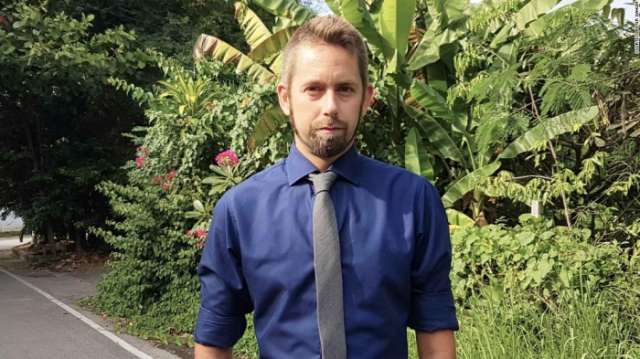
Peter Dahlin, a Swedish national, was detained in China on January 4, 2016 and held for three weeks.
Just months earlier, Sui says he was held at a police training facility in Guangzhou, the free-wheeling hub of China's manufacturing heartland where he worked as a human rights lawyer defending a number of high-profile activists.
He says interrogators accused him of inciting subversion and pressed him to give them details ranging from his personal life and finances, to his work, clients, and all of his contacts.
Initially he refused to answer the questions, but his resistance only made his interrogators push harder. "They wouldn't let me sleep for four days and nights. By the fifth day, I felt like I was going to die," he said.
Sui said it was the sleep deprivation plus threats of torture which ultimately broke his will and made him cooperate. He said investigators threatened to shackle his hands, hang him from the ceiling and shine a flashlight directly into his eyes.
"I knew someone who had a heart attack due to deprivation of sleep in jail, so I was a bit frightened my life could be at risk if I continued to fight back," he said.
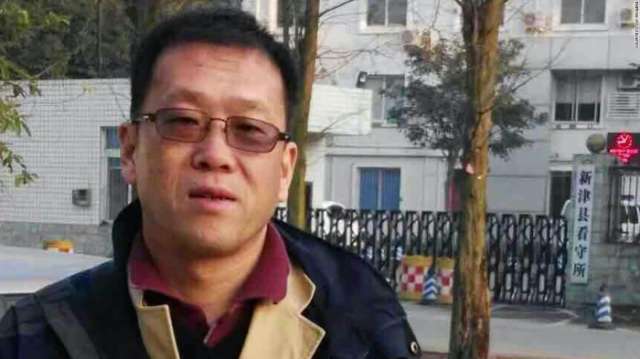
Sui Muqing, a lawyer, was detained from July 10, 2015 until January 6, 2016.
Chen, a professor who advocated for a US-style jury system in China on his blog, was first accused of "picking quarrels and provoking troubles," -- a vague charge often used by Chinese authorities that can carry a 10-year prison sentence. He told CNN he refused to admit any wrongdoing during a 20-hour interrogation, but then found himself sharing a jail cell with inmates accused of crimes ranging from petty theft to murder.
"The cell was so crammed I had to ask other prisoners to make room so I could urinate and defecate," he said. "I didn't have a spoon or chopsticks to eat with. We'd get one scoop of rice and would have to eat it with our hands."
After a month, Chen said he was told to collect his belongings. He thought he was going home - but instead was driven to what appeared to be an abandoned hotel and held for another 10 days.
Earlier this year, CNN visited the nondescript building where Chen said he was held in Guilin, a southern city famed for its stunning landscape of karst mountains. Signs posted around the area in Chinese and English marked it as military property, but it otherwise appeared open and accessible.
Local officials denied that the building was used as a secret detention center.
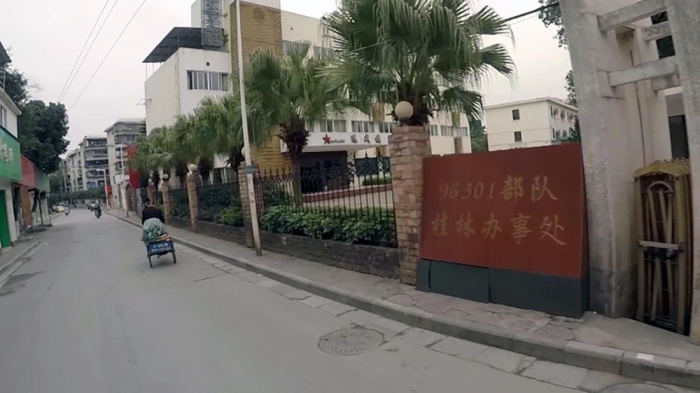
The building in Guilin where Chen Taihe said he was held.
'You have to confess'
The rights activists held captive weren't just concerned about their own well being. They say their loved ones were also threatened. Dahlin's interrogators made it clear that they'd keep his girlfriend, a Chinese national, in custody for as long as it took to resolve his case.
"She was taken hostage just to put pressure on me," he said. Dahlin asked about his girlfriend every day but got limited answers.
"They said she was being treated quite well. That she was being given yogurt and fruit and things like that. She was allowed to make a few drawings and do yoga in her room," he said. "They knew she had nothing to give them."
Finally, after more than three weeks, Dahlin was told he was going to be released -- but he had to do one thing: confess on camera. He said he knew what authorities were really going to do with it. But wanting to speed up his release -- and that of his girlfriend - Dahlin agreed to play his part.
He was taken into a room where a woman from state broadcaster China Central Television (CCTV) was sitting with a cameraman. Dahlin was handed a piece of paper with the questions that she would ask and the answers he would give.
"I have caused harm to the Chinese government. I have hurt the feelings of the Chinese people. I apologize sincerely for this," Dahlin said in the confession broadcast nationwide and splashed across state-run newspapers. Immediately after its broadcast activists denounced it as a forced confession -- one of many that have been shown on CCTV in the years since Xi came to power.
Sui and Chen said they had to make similar "confessions." All three men now maintain their innocence, but they said they had no choice but to do as authorities wanted. Sui says he admitted to charges of inciting subversion. Chen told CNN he confessed to charges of picking quarrels and provoking troubles, inciting subversion and embezzlement. "You have to confess," Chen said. "Otherwise they won't let you go."
No end in sight
The crackdown on lawyers is still taking place. On Tuesday, a court in Changsha, central China sentenced human rights lawyer Jiang Tianyong to two years in prison after convicting him of inciting subversion against the state.
In August, he had confessed in a trial that was streamed live online and watched by his wife Jin Bianling in California.
"He used to tell me, if I ever admit to a crime like this, it means I've been tortured," Jin said.
Jiang was a prominent human rights lawyer who had represented some of his colleagues targeted in the 709 crackdown, and was an outspoken critic of the government. He disappeared in November 2016, en route to catching a train from the central city of Changsha to Beijing. Months went by before the authorities confirmed he had been detained.
"Please give me another chance to be a human being ... and to make up for my wrongdoings," Jiang told a panel of three judges at his August trial.
Albert Ho, a Hong Kong-based activist with the China Human Rights Lawyer Concern Group, said Jiang, like other lawyers his group has spoken to, likely admitted to the charges in order to live to fight another day. "Only an idiot would believe that he is truly speaking from his heart," Ho said.
Sleeping with a knife
Six days after his "confession" was broadcast on CCTV, Dahlin was released and expelled from China. His girlfriend was also released without charge. Dahlin is now based in Thailand, but has trouble forgetting his time in detention.
"Early on it was quite extreme. Every little noise at night would wake me up. I'd sleep with a knife next to my bed, ready to stab the first Chinese person who comes into my gate," he said.
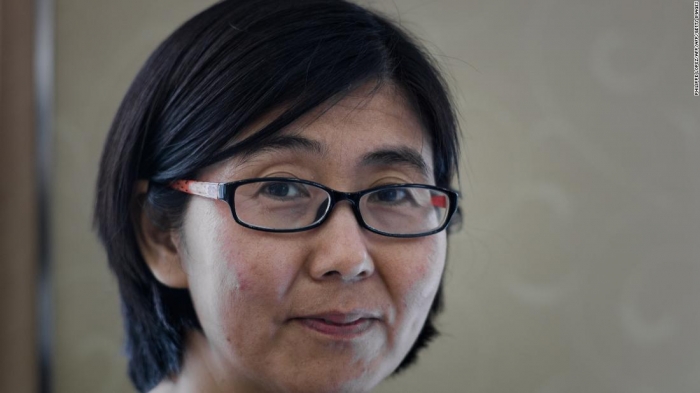
Wang Yu poses during an interview in Hong Kong on March 20, 2014.
Wang Yu, the first lawyer detained in the 709 crackdown, was charged with subversion, while her husband was charged with inciting subversion. They were both released on bail after more than a year in custody, after Wang's taped confession was aired on CCTV.
In it, Wang renounced her legal work and blamed "foreign forces" for using her law firm to undermine and discredit the government. Their son, who was detained along with them, was released soon afterward, but his movements have been heavily restricted.
Authorities never aired Chen's statement. He was released a day after recording it and the charges against him were dropped.
"I have no criminal record, but they can still use the video to discredit me," he said. Chen and his family now live in US, where he's a visiting scholar at the University of California's Hastings Law School and studies the US jury system. He said he won't return to China until it becomes more democratic.
Sui was released on bail after his "confession," which was also never broadcast. He continues to practice law in Guangzhou, but said his movements have been restricted and fears the worst may still be yet to come. "It's increasingly difficult to maintain a harmonious society through brainwashing," Sui said. "The only resort left is violence. For anyone who's not submissive, a brutal crackdown is on the way."
By Chieu Luu and Matt Rivers, CNN
More about: #China








